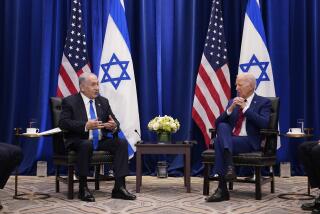Clinton, Barak Work to Build Relationship
- Share via
WASHINGTON — President Clinton and new Israeli Prime Minister Ehud Barak on Thursday opened what both called an era of renewed U.S.-Israeli cooperation, carefully smoothing over some budding disputes and pledging to let nothing stand in the way of their drive for Middle East peace.
Speaking to reporters in the White House Rose Garden at the start of the Israeli leader’s six-day visit to the United States, Clinton and Barak appeared determined to end the friction that marked their two countries’ ties during the term of Barak’s predecessor, Benjamin Netanyahu.
Later, after a 2 1/2-hour meeting, officials on both sides said Clinton and Barak were satisfied with the talks so far. The two continued their discussions Thursday night at Camp David in the Maryland mountains and plan another meeting Monday.
Clinton and Barak sought to clear the air in the wake of less-than-diplomatic comments each made in recent weeks that threatened to sour their personal relationship before it began. For instance, Barak said Thursday that his call for a lower U.S. profile in Arab-Israeli peacemaking is actually designed to make Washington’s role more effective. Clinton agreed.
Clinton insisted that his administration has not changed its neutral stance on the emotional issue of Palestinian refugees, tacitly retracting his assertion that Palestinians should be able to live wherever they like. Barak seemed pleased.
And both men insisted that no offense was intended--and none taken--by Clinton’s offhand remark during a political appearance in Florida that he was looking forward to his meeting with Barak like “a kid with a new toy.” Contrary to the interpretation of some in the Israeli press, Clinton said he didn’t mean that he considers Barak someone who could be played with.
U.S. officials said Clinton’s objective for his talks with Barak is to determine how he plans to proceed with Middle East peacemaking and to offer whatever help the Israelis need.
Officials on both sides said the underlying theme of the visit is establishing a personal relationship between the leaders. After Thursday’s opening meeting, both sides said the relationship appeared to be developing well--although Barak, Israel’s most decorated soldier, has a public persona that is stiff and formal, and Clinton, America’s most famous draft-avoider, has a fondness for informal camaraderie.
Alluding to Clinton’s ill-concealed hostility toward Netanyahu, a senior U.S. official said, “The working relationship that we’ve had the last couple of years on peace is not what we would have wanted it to be, not what it needs to be, and not what, in fact, I’m confident that it’s going to be.”
On one issue that had troubled some U.S. officials, Barak insisted that he intends to turn over to Yasser Arafat’s Palestinian Authority an additional 13% of West Bank land as required by the Wye agreement, which Netanyahu and Arafat signed last year. Netanyahu froze compliance with the pact, complaining that the Palestinians had not kept their side of the bargain.
“We need to abide by the previous agreements signed by all parties, including the Wye accords,” Barak said. Although he made it clear that he would prefer to link Israeli compliance to a start on accelerated “final-status” peace negotiations, he said he would try to change the procedure “only through an agreement with Arafat after mutual, open, frank and direct discussions.”
In contrast to Netanyahu’s focus on the Palestinians, a senior Israeli official said, Barak plans to pursue talks with Syria too.
“There will be in the coming weeks a very serious attempt to restart negotiations with Syria,” the official said.
Earlier this week, Barak said Netanyahu had assigned too large a role to U.S. mediators in negotiations with the Palestinians, raising speculation that he wanted to downgrade Washington’s role. But Thursday, he insisted that the United States remains indispensable. “I think that the United States can contribute to the process more as facilitator than as a kind of policeman, judge and arbitrator at the same time,” he said.
Clinton agreed: “The peace process worked best when we were essentially facilitating direct contacts between the parties.”
More to Read
Sign up for Essential California
The most important California stories and recommendations in your inbox every morning.
You may occasionally receive promotional content from the Los Angeles Times.













